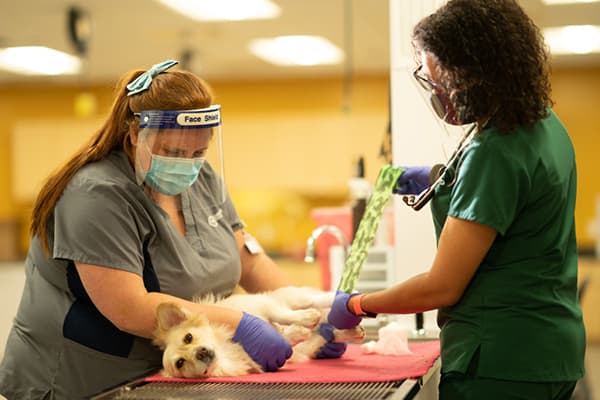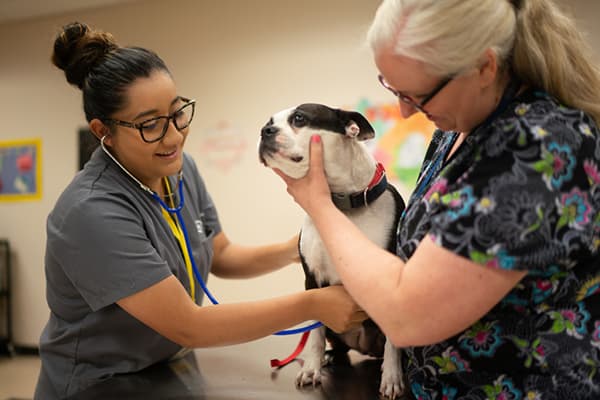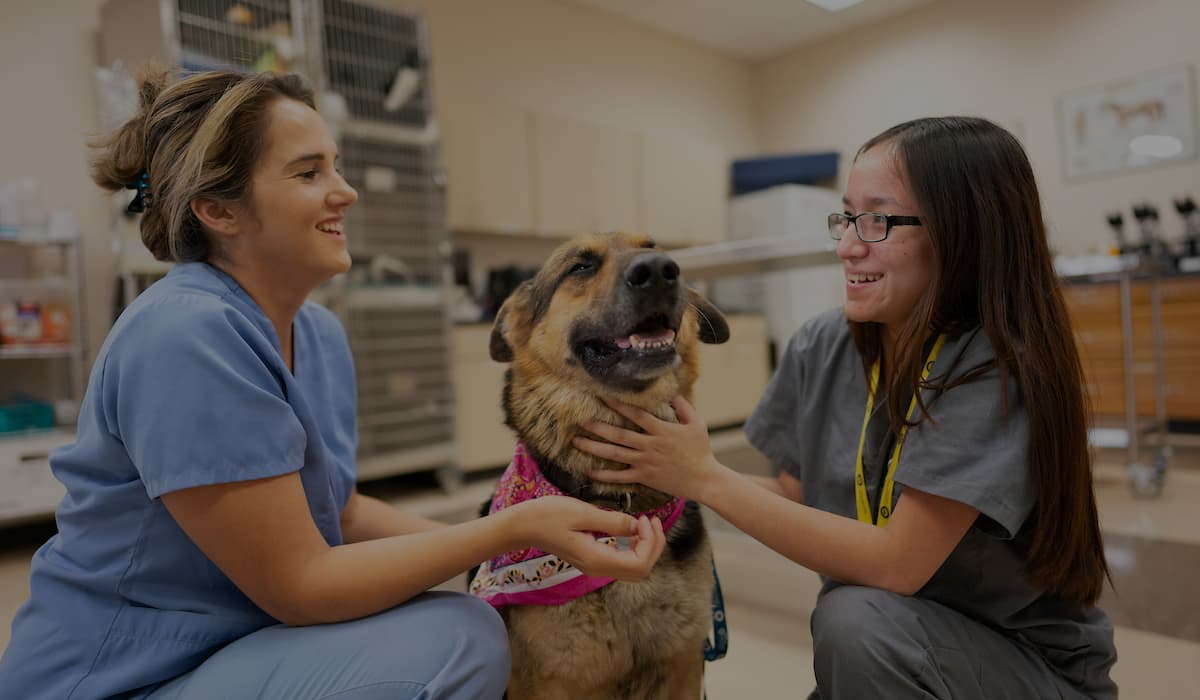Request Information
Veterinary technicians offer assistance to veterinarians and their offices. Vet techs enjoy a variety of responsibilities, including assisting veterinarians with animal care during sick visits or handling samples or labs in more research or clinical settings. It’s a rewarding career for those who love animals.1
This article provides an overview of the job outlook, certification requirements and educational pathways for an aspiring veterinary technician.
What Does a Vet Tech Do?
A veterinarian technician works under the supervision of a licensed veterinarian. They typically work in practices that care for cats and dogs but may also work with mice, cattle, primates or other animals. Some veterinary technicians specialize in a discipline such as anesthesia, emergency care, dentistry or zoological medicine.1
Vet tech responsibilities may include performing tests, analyzing samples and preparing vaccines in a lab environment to diagnose and treat disease in animals. Other times they work in a private clinical practice where they take on some responsibility of talking to and educating pet owners. They may assist veterinarians with surgical procedures or projects like biomedical research. They are responsible for the humane treatment of animals in research-related jobs.1
Veterinary technicians are responsible for the hands-on care of animals under the supervision of a licensed vet. Some of these tasks include observing sick animals, providing emergency first aid, administering anesthesia, vaccines and medication, taking x-rays and collecting blood and urinalysis samples, and preparing animal surgery stations and instruments.1
Veterinary technicians write down their observations, updates to a pet’s care plan and notes on their progress in an animal’s medical file. They should be comfortable observing, notating, transcribing and maintaining both written and electronic records. They should be able to communicate their findings to important people including their managing veterinarian. They may also be asked to help maintain an office’s records, drug inventory and laboratory equipment.2
In general, these are some core traits that may be in a vet tech job description:2
- Communication skills: you need to be able to talk to supervisors and animal owners.
- Compassion: for both animals and pet owners who may be experiencing hardship due to illness or death.
- Attention to detail: it’s crucial vet techs are precise when documenting information, performing tests or giving pets medicine.
- Manual dexterity: it’s important that vet techs have a steady hand for crucial tasks like giving vaccines or taking x rays.
- Physical strength: vet techs may need to lift or restrain larger animals.
Benefits of Being a Vet Tech
If you love animals and want to work with them professionally, a career as a veterinary technician offers you the chance to help animals in both private clinics and animal hospitals among others. You also have the chance to work with pet owners and ease their fears or educate Registered Vethem about their pets. You can finish school in as few as 19 months and can usually be in the field as a Registered Veterinary Technician shortly after completing the Veterinary Technician National Exam.
Vet Tech vs Vet Assistant
While they both work in veterinarian’s offices, veterinary technicians and veterinary assistants have different job functions. Both titles assist in bathing and caring for animals and maintaining clean office equipment. The biggest difference is that vet techs are allowed to do more complex procedures.

-
Monitoring an animal after surgery
-
Performing emergency first aid
-
Administering anesthesia
-
Taking x-rays or samples and performing lab tests
States with the highest employment level in Veterinary Technologists and Technicians as of May 2022, according to the BLS:3
| State | Employment | Employment per thousand jobs |
| Texas | 13,230 | 1.02 |
| California | 10,160 | 0.58 |
| Florida | 9,520 | 1.03 |
| Pennsylvania | 5,220 | 0.90 |
| New York | 4,970 | 0.55 |
Prepare for Your Career as a Veterinary Technician
Carrington College focuses on small class sizes and hands-on training. Here you’re more than a face in a room. Take the first step on your way to a new career in Veterinary Technician.
Veterinary Technician Jobs
Veterinary technicians work in a variety of environments. Both part-time and full-time jobs exist for aspiring vet techs. Veterinary technicians may have to work evenings, weekends, and holidays.
Veterinary Technicians These individuals usually work in private clinical practices under the supervision of a licensed veterinarian. Technicians may do laboratory tests, including urinalysis. They may also help veterinarians conduct varying other diagnostic tests. They perform some of their work in a laboratory, but may also talk with pet owners. For example, they may describe the pet’s condition or advise on how to administer medication that is prescribed by a veterinarian.1
How to Become a Veterinary Technician
Are you wondering how to become a vet tech? Although each state regulates veterinary technicians differently, most candidates must pass a credentialing exam. Most states require technicians to pass the Veterinary Technician National Examination (VTNE), offered by the American Association of Veterinary State Boards.
According to the Bureau of Labor Statistics, “Veterinary technicians must complete a postsecondary program in veterinary technology. Veterinary Technicians need a two-year associate’s degree to work in this role. Technicians generally have to pass a credentialing exam to be registered, licensed, or certified, depending on the requirements of each state they work.”4
There are no prerequisite college requirements for the Carrington College program. It’s never too early to begin broadening your skills. Consider taking biology and other science courses in high school.2
Do I Need to Be Certified to Be a Vet Tech?
Most states vary when it comes to their credentialing requirements, however, in general, one must pass the VTNE, administered by the American Association of Veterinary State Boards, to become a registered veterinary technician. The board doesn’t send a vet tech license or vet tech certification directly so individuals should work with their state authorities to obtain a physical license.
What to Look for in Veterinary Technology Program
Not all programs are the same. Keep some of your personal goals in mind and consider the following to find the right school for you:
- Hands-on experience: It’s important that you get some real-life experience working in vet offices and with animals. Make sure your program offers a blend of classroom instruction and clinical experience.
- Instructor quality: Research your school and find reviews on instructors. Find instructors that have specialties in an area you want to study and consider asking them to be your mentor or at least recommend externship or post-graduation opportunities.
- Cost: Find a program that you can afford. Talk to your school’s financial services department to determine what alternative funding options such as grants and scholarships exist for you.
How Long is a Vet Tech Program?
The Veterinary Technology program at Carrington College can be completed in as few as 19 months. You will graduate with an associate degree.
Can I Attend Veterinary Technology School Online?
Carrington does not offer the Veterinary Technology program online. This, in large part, is because of the need to have in-person time with animals and in vet settings. Some vet tech schools may offer blended learning with some online vet tech courses and others in person.
Prepare for Your Career as a Veterinary Technician
Carrington College’s Veterinary Technology program offers you the hands-on training you need for a job as Veterinary Technician. Take the first step on your way to a new career.

What Will I Learn in Carrington’s Veterinary Technology Courses?
Carrington College prepares students to take appropriate certification and licensure exams related to their individual majors. The College does not guarantee students will successfully pass these exams or be certified or licensed as a result of completing the program.
Vet Tech Classes
The following Carrington College Veterinary Technology program courses include both general education and theory and practice in veterinary technology:
- AS110 Introduction to the Veterinary Hospital
- AS111 Basic Anatomy and Physiology
- CLT100 Computer Literacy
- ENG101 English Writing and Composition
- MAT101 Principles of Mathematics
- MAT151 College Algebra
- NUT200 Principle of Nutrition
- SPH205 Interpersonal Communications
- VT105 VT Externship
- VT120 Veterinary Applied Sciences
- VT121 Companion Animal Diseases
- VT122 Clinical Procedures 1
- VT123 Clinical Rotation
- VT130 Surgical Assisting
- VT131 Anesthesia for Veterinary Technicians
- VT132 Clinical Procedures 2
- VT133 Clinical Rotation
- VT140 Large Animal Medicine
- VT141 Veterinary Technology Specialties
- VT142 Advanced Clinical Procedures and Surgery
- VT143 Clinical Rotation
- VT150 Licensure Exam Comprehensive Review
Prepare for a Career in Veterinary Medicine With Carrington College
A Veterinary Technology degree can be a rewarding way to take your passion for animals and make a career out of it. The best way to prepare for a career as a vet tech with Carrington College is to reach out to one of our representatives to learn more about the program.
We offer our Veterinary Technology program at five locations:
Vet Tech FAQ
How long does it take to become a vet tech?
It can take as little as nineteen months.
Do I need to be credentialed to work as a vet tech?
Although each state regulates veterinary technicians differently, most candidates must pass a credentialing exam. Most states require technicians to pass the Veterinary Technician National Examination (VTNE), offered by the American Association of Veterinary State Boards
Where can I work as a vet tech?
Veterinary technologists and technicians typically work in private clinics and animal hospitals. They also may work in laboratories, colleges and universities, and humane societies.5
How much does a vet tech make?
Like other occupations, the money that a veterinary technician can earn may vary widely based on several factors.
Some of these factors may include the geographical location and setting in which they work, the number of scheduled work hours, and the training, education and skill level they have achieved in veterinary technology.
Is being a vet tech worth it?
Only you can decide whether becoming a veterinary technician is the right career for you. Becoming a vet tech may be a good fit for you if you:2
- Have compassion and can treat animals with kindness and sensitivity in dealing with the owners of ill pets
- Are detailed oriented and can demonstrate preciseness when recording information, performing diagnostic testing and administering medication
- Able to handle animals, medical instruments and lab equipment with care
- Have steady hands for intricate tasks such as performing dental work, administering anesthesia and taking x rays
- Have the physical strength to manage and lift animals
What do vet techs wear?
Veterinary technicians usually wear medical scrubs on the job.
Sources:
- www.bls.gov/ooh/healthcare/veterinary-technologists-and-technicians.htm#tab-2
- www.bls.gov/ooh/healthcare/veterinary-technologists-and-technicians.htm#tab-4
- www.bls.gov/oes/current/oes292056.htm#st
- www.bls.gov/ooh/healthcare/veterinary-technologists-and-technicians.htm
- www.bls.gov/ooh/healthcare/veterinary-technologists-and-technicians.htm#tab-3
- www.onetonline.org/link/summary/29-2056.00
Updated:
January 29th, 2023
